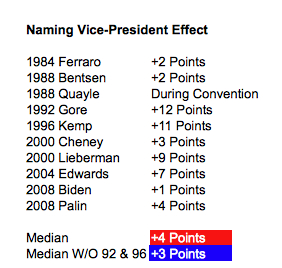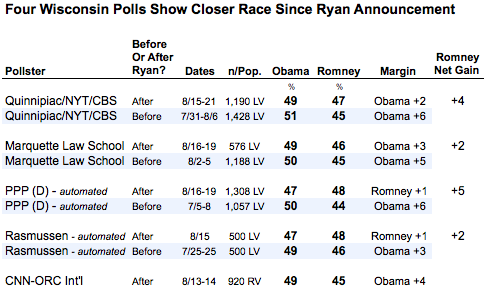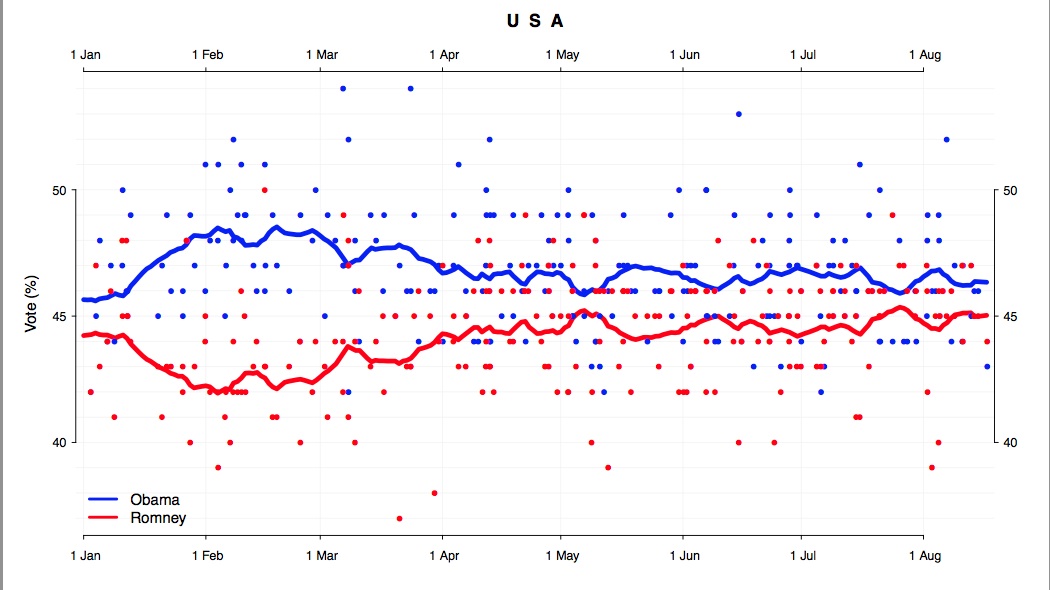It’s been almost two weeks since Mitt Romney announced his selection of Paul Ryan as his vice presidential running mate, which provides enough time to take a first look at Ryan’s impact on the race so far. In this vein, I think it is instructive to recall the pundits’ immediate assessment of the Ryan pick. Needless to say, the reaction evinced a distinct partisan slant. Romney supporters hailed the pick as Obama’s “worst nightmare”, a bold choice that offered voters a clear contrast between the President’s unsustainable big spending, deficit-enhancing policies versus a Romney-Ryan led return to fiscal prudence and economic growth. Moreover, by refocusing the campaign on how best to fix the economy, the Ryan pick shifted the media narrative away from Bain Capital and Romney’s tax returns and, not incidentally, put Wisconsin back in play. Obama’s backers, on the other hand, described the Ryan pick as a stunningly bad choice , one that not only exposed Romney’s weak electoral hand but also refocused the campaign from a referendum on Obama’s middling economic record to a debate over Ryan’s radical House-backed budget legislation, including politically controversial proposals to reform Medicare.
Anyone reading this punditry might wonder if they were describing the same man! Clearly, however, partisan pundits on both sides indicated that the Ryan pick – if not a “game changer” – was surely consequential in terms of the race. The divide was over whether it would help or hurt Romney.
There was a third possibility, of course, one that I proposed in a post written shortly after Romney’s pick was announced: that it wouldn’t have much impact on the race at all. As I wrote then: “There is always a tendency for the media, particularly in the news-starved period that is August, to overreact to these types of political events. Pundits have been quick to analyze what the Ryan pick tells us about Romney’s campaign strategy, and to assert that this high risk-high reward type of pick is destined to shake up the race. But we should not let the sheer volume of media analyses blind us to a third potential outcome: that the pick will be largely inconsequential. Romney, after all, still heads the Republican ticket and the economic fundamentals will still likely drive the decision for most voters.”
I based my prediction on the historical record. To begin, polls suggest that for most people in previous election the VP pick did not influence their vote choice for the top of the ticket. Moreover, Harry Enten shows the median impact of the VP pick on a candidate’s polling status prior to the convention is about 4%.

Those figures, moreover, tell us nothing about how long that 4% bump lasts. As you can see from Enten’s chart, three of the four biggest bumps came during losing efforts. Even that celebrated “game changer” Sarah Palin likely had a minimal impact on the outcome of the 2008 race. Although exit polls indicate that McCain won, 56%-43% among the 60% of respondents that said the Palin pick was “a factor” in their vote, it was not enough to swing the election his way.
All this suggested to me that despite the projections of the partisan punditry, the Ryan pick would have little lasting impact on this campaign. So far – with one potential caveat – I seem to be right. Stanford political scientist Simon Jackman’s analysis of polling data suggests the race remains virtually unchanged, with Obama leading Romney by about 46%-45%, as indicated in this graph.
That’s consistent with Mark Blumenthal’s assessment at Pollster.com.
This is not to say the Ryan pick was without consequences, however. To begin, it appears to have mobilized the Republican base which has responded by opening its collective pocketbooks and contributing to the Romney campaign. Perhaps of greater significance, it may have tightened the race in Ryan’s home state of Wisconsin. As this Pollster.com chart shows, Romney has gained an average of about 3% in four Wisconsin polls of likely voters since the Ryan pick was announced, which narrows Obama’s lead there from about 5-6% to closer to 2-3%.

We can’t be sure, of course, whether this polling bounce will last, but for now it makes Wisconsin almost a tossup. If Romney were to win Wisconsin, and its 10 Electoral College votes, it provides him with a bit more flexibility in how to put together enough states to reach the 270 Electoral College vote threshold. Keep in mind, however, that states tend to move together; if Romney picks up the additional 2-3% needed to put him over the top in Wisconsin, he’s likely to do so in other battleground states as well. So we shouldn’t fixate on Wisconsin as the key to Romney’s electoral fortunes.
At this point, then, I stand by my initial assessment: the Ryan pick will likely have at best a marginal impact on the 2012 presidential election.
Meanwhile, On Wisconsin! (This one’s for you, Cason…..)
[youtube watch?feature=player_detailpage&v=SOh-1fNGxBE]

